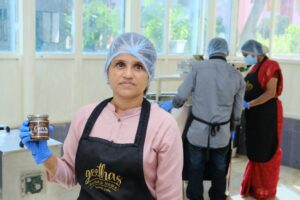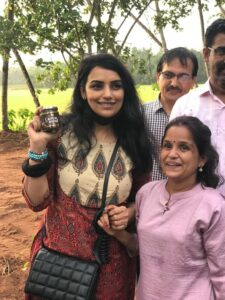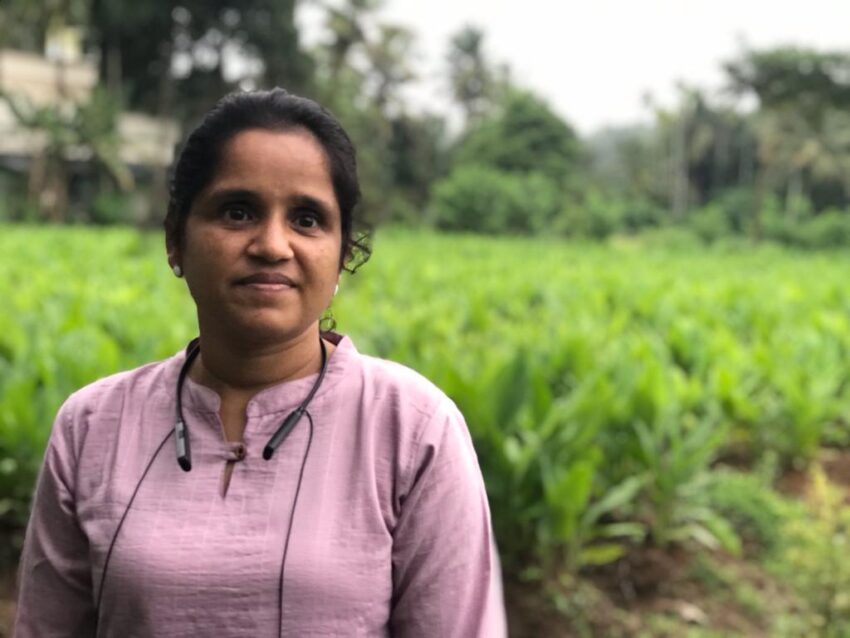N.B. Nair
At the age of 13, her eyesight started falling. By 15 years, she became visually challenged. She was diagnosed with retinitis pigmentosa. Both her siblings were also afflicted by the rare genetic disorder. The world came crumbling down for M.V. Unnikrishnan and V.C. Radha, the parents of three children, when they realised all their three children would not be able to see. They were crestfallen about the future of their children.
The story of Geetha Saleesh from Ottappalam in Kerala is awe-inspiring as she defeated fate to overcome every obstacle in her life. Geetha was very good at studies, but when she told her school teachers about her problem, they first did not believe it as her eyes looked normal. But one of her teachers was sympathetic to her plight and helped her write the school final examination, with the help of a scribe.
“The teachers initially refused to help me to write the examination. They saw me moving around like anyone else. I told another teacher who taught me. It was he who suggested that I could use a scribe to write the examination. Once the examination was over, the teacher advised me to learn braille language to continue my studies further,” Geetha told Inspirational India about her predicament.
After her school, Geetha went to study braille language for eight months as also some vocational trades. Once it was over, she joined Sree Kerala Varma College in Thrissur, for senior secondary and graduation courses.
It was in college she learned about the possibilities of further education for a visually challenged person and getting a job.
“It was in Kerala Varma College, I met her future life partner Saleesh Kumar,” she giggled.
The marriage and birth of two children did not deter Geetha from doing something in life. “I was not prepared to resign to fate and sit idle,” she said.
But when she tried for jobs, she did not receive any encouragement. Her contention was that if she is able to do everything at home and bring up two children without the help of anyone, she can take up any vocation. “Unless you give me an opportunity, how would I prove my worth,” Geetha told her prospective employers, who turned her down.
“But my husband gave me encouragement and asked me to do whatever I could,” Geetha added.

First, she started rearing chicken and quail at home, selling its eggs. But the onset of COVID-19 and the lockdown came as a damper. Earlier in 2011, she had started a restaurant in Thrissur town along with her husband. But unfortunately, after about two years, the owners of the building decided to pull it down for renovation and they had to shut down their restaurant.
“I used to help in the kitchen along with my workers. Once I map the place, I could move around and do anything, as any other person with normal eyesight,” she explained about her first experience of starting a restaurant, which was named “Flora.”
That was Geetha’s first experience with a business venture. But it was a learning curve. Once the restaurant failed, we thought of a product using turmeric and decided to brand it. The first product using turmeric was for use by adults.
“We decided to make a turmeric product, which can be given even to children directly. We researched the possibilities and developed Curcu Meal. Besides, the basic ingredient of pure organic turmeric contains dates, almonds, and jaggery. It is prepared in pure coconut milk,” she explained about the product. “We have also added pepper to it, to increase the digestibility of curcumin among children.”
“To increase the shelf-life of Curcu Meal, we add permitted preservatives to a minimum quantity – between 0.001 to 0.002 percent. Since it is made in coconut milk, which turns into virgin coconut oil, it can be stored for one year.”
Geetha’s Home to Home has also added a second product named First Drink. “It is meant to be taken as the first drink in the morning. Its ingredients are pure turmeric, pepper, cinnamon, and stevia – a natural sweetener. It is a healthy drink for everyone. Since it contains zero calories and no sugar, even diabetic patients can take it,” she spoke about their second product.
Once Geetha’s company started producing these two turmeric-based products, she understood, the quality of turmeric available in the market is not organic and she decided to cultivate it. They have selected the roots developed by the Indian Institute of Spices Research Cente, under the Indian Agricultural Research Institute in Kozhikode named Pratibha. This variety has the highest curcumin content and gives a higher yield. It also has better disease resistance.

“We started cultivation of turmeric on a small scale. Film actor Shweta Menon has also given her ancestral land for the cultivation of turmeric. The selection of land is also important – only land where no other farming is done is appropriate for it. In Pathanamthitta, two Panchayats helped us support to identify some farmers. We gave them the roots, and trained them first on farming,” Geetha added.
Geetha’s company has an agreement with these farmers to buy back the entire produce at a higher price than the market price. The farmers were happy as all their earlier cultivations were destroyed by wild boar, but fortunately, the animals did not damage turmeric plants. She now plans to extend the cultivation of turmeric to more areas on their guidelines.
Geetha said several supermarkets have started sourcing their products. Mainly, marketing of their products is done directly through their website. She said customers from across the country buy their products. About 60 percent of their customers are from Mumbai, Bangalore, Delhi, Chennai. They are now planning to market their products through e-commerce platforms and venture into export markets.
Geetha is an inspiration for differently abled persons, who normally resign to their fate instead of developing their capabilities and charting their own future independently. While Geetha manages the production, Saleesh Kumar helps in outdoor works including marketing.
Image courtesy: Geetha Salesh

